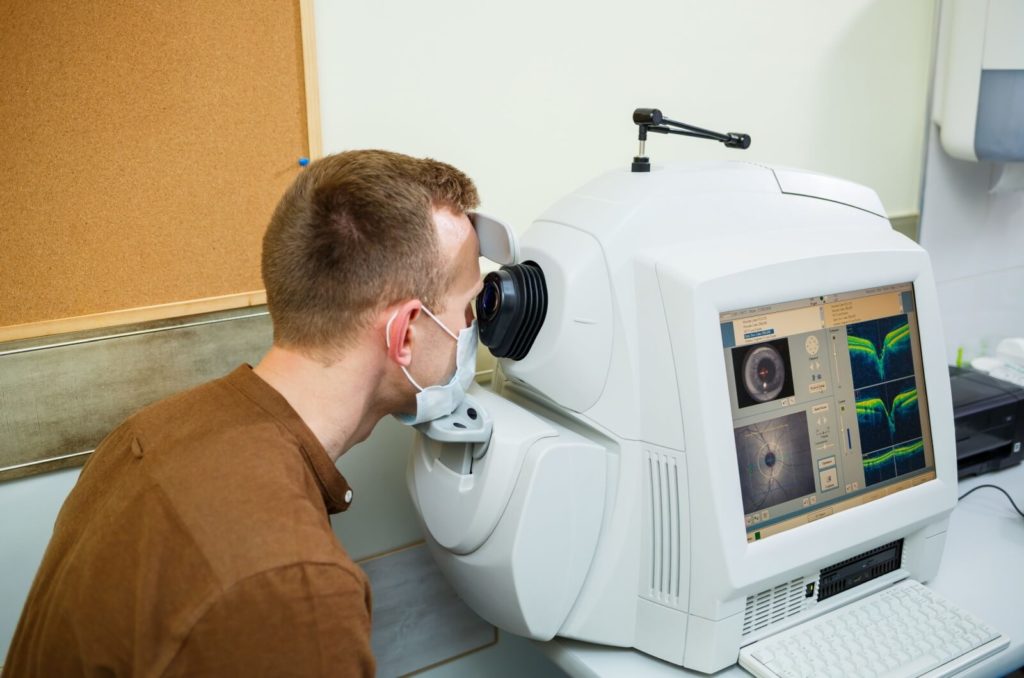Our eyes show a glimpse of our overall health status. In fact, unbeknownst to us, many general health concerns can manifest their presence in our eyes.
Diabetes is a chronic health condition that can impact our ocular health and vision. A diabetic eye exam allows your optometrist to evaluate the eye’s internal structures to look for diabetic changes by dilating the pupils.
How Diabetes Affects the Eyes
Diabetes is a chronic health condition that affects your body’s ability to produce or use insulin effectively.
Insulin is a hormone that helps your body convert sugar into energy. Without enough insulin, sugar builds up in the blood, leading to a host of potential health problems.
There are two main types of diabetes, Type 1 and Type 2.
Type 1 diabetes is often diagnosed in childhood and develops when the body doesn’t produce insulin, while Type 2 usually develops in adulthood, and occurs when the body can’t use insulin effectively.
Leaving diabetes unmanaged has profound effects on your vision and ocular health, and can increase the risk of developing eye diseases:
- Diabetic retinopathy: Develops over time when high blood sugar levels damage the small blood vessels in the retina. These damaged vessels can leak fluid, bleed, or become blocked, and new, fragile blood vessels may grow abnormally. This is one of the leading causes of vision loss in adults.
- Diabetic macular edema: Develops when damaged blood vessels in the retina leak fluid into the macula, causing it to swell, affecting central vision, and reducing the ability to see sharp, detailed images.
- Glaucoma: Diabetes almost doubles the risk of developing glaucoma, which can develop when newly formed blood vessels grow on the iris and block the normal flow of fluid out of the eye. This obstruction increases eye pressure, leading to optic nerve damage.
- Retinal detachments: Occurs when scar tissue from new blood vessel growth caused by diabetic retinopathy pulls on the retina, causing it to detach from the back of the eye. If not treated quickly, this can lead to permanent loss.
Managing your diabetes is key to reducing the risk of developing these eye conditions, but it won’t eliminate them entirely.
Certain symptoms can indicate the onset of concern potentially caused by diabetes. If you notice any of these symptoms, visit your optometrist as soon as possible:
- Blurry or fluctuating vision
- Flashes or floaters
- Sudden or gradual vision loss
- Pain or eye pressure
Many eye conditions can manifest silently or suddenly, and not display any symptoms until the damage has progressed. Regular diabetic eye exams help monitor diabetes and evaluate the health of the eye’s internal structures, aiming to detect any potential concerns early.
The Diabetic Eye Exam
A diabetic eye exam is a specialized exam that focuses on evaluating the eye’s internal structures to look for any diabetic or abnormal changes by dilating the eyes.
When the eyes are dilated, the pupils are wide, allowing more light to enter the eye, and allowing your optometrist to see the eye’s internal structures more broadly, which is otherwise more difficult to check in an undilated ocular health evaluation.
Those with diabetes are encouraged to have this exam at least once a year. Being consistent in these visits is important as diabetic eye diseases can progress silently with little to no symptoms in their early stages.
These annual visits allow your optometrist to continuously monitor your eye health for any diabetic changes. They can detect any changes or complications early, allowing timely intervention and management to prevent serious complications.
Fortunately, our province understands the importance of these exams, which is why diabetic eye exams are covered under Alberta Healthcare. For our patients, this means there’s no cost for the actual appointment.

What to Expect During Your Diabetic Eye Exam
Knowing what to expect during your diabetic eye exam can make the appointment feel less overwhelming. The exam itself is relatively gentle. At most, you may feel some slight stinging as the drops are put in.
The appointment is usually longer than a routine eye exam and can take anywhere from 30 minutes to an hour. This is because it may take anywhere between 20 to 30 minutes for the drops to fully dilate your pupils and what kind of tests your optometrist would like you to complete.
The drops tend to make your vision slightly blurry and sensitive to light, which is why we recommend bringing a trusted companion to drive you home, and some sunglasses to make you feel more comfortable. It can take around 6 hours for your vision and pupils to return to normal.
The exam starts by measuring the pressure inside of your eyes with a tonometry instrument. This helps check for any signs of glaucoma.
In some cases, you may be asked to complete a visual field test, which assesses your peripheral vision, and helps check for any vision loss caused by glaucoma. It involves looking straight ahead into a device that flashes lights in different areas of your field of vision. You will be asked to indicate when you see the light, allowing the test to map out any areas where your vision may be compromised.
Then, special eye drops are used to dilate your pupils. Once dilated, your pressures are rechecked, and advanced imaging techniques using OCT imaging and retinal photos are used to take cross-sectional scans and images of your retina, optic nerve, and blood vessels.
Inside the exam room, your optometrist uses a slit lamp and ophthalmoscope to physically evaluate the health of your eye. They will also discuss the findings of your visual field test, OCT scans, and retinal photos and recommend any needed treatments or follow-up appointments.
Schedule an Appointment
Diabetes can have a profound impact on your eye health, but regular diabetic eye exams can help protect your vision.
Connect with our team at The Eye Care Centre in Red Deer to schedule your diabetic eye exam.



